
Time to Speak Russian__Grammar Notes
.pdf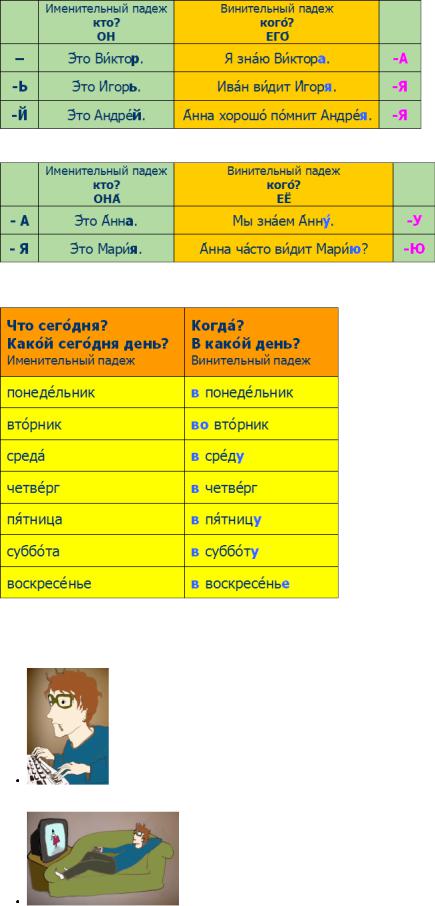
20.06.2015 Time to Speak Russian::Grammar Notes
But for masculine animate nouns, these endings will be different.
"Антон и Виктор друзья". "Anton and Victor are friends." "Антон знает Виктора, а Виктор знает Антона". "Anton knows Vi Anton."
BUT! In the Accusative case animate feminine singular nouns have the same endings as inanimate ones:
WHEN? DAYS OF THE WEEK
Compare:
 Сегодня понедельник.
Сегодня понедельник.
 В понедельник я обычно работаю.
В понедельник я обычно работаю.
 Во вторник, в среду, в четверг и в пятницу я тоже работаю.
Во вторник, в среду, в четверг и в пятницу я тоже работаю.
 Когда я отдыхаю? Я отдыхаю в субботу и в воскресенье.
Когда я отдыхаю? Я отдыхаю в субботу и в воскресенье.  Вокресенье было вчера. Вчера, в воскресенье, я отдыхал.
Вокресенье было вчера. Вчера, в воскресенье, я отдыхал.
SUBJECT OF THOUGHT OR SPEECH
Prepositional Case with the preposition "О" ("about")
The noun which describes an object of thought or speech must be put in the Preposional case with the preposition "o" (about). Usual
http://www.speakrussian.cie.ru/time_new/eng/grammar/ |
21/59 |
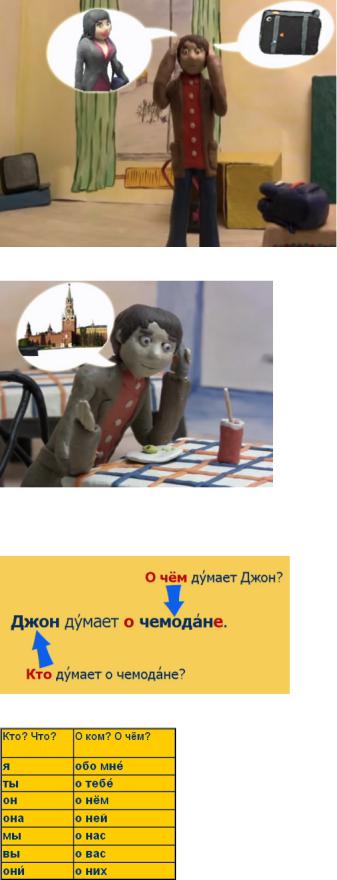
20.06.2015 Time to Speak Russian::Grammar Notes
verbs "говорить" (talk about), "думать" (think about", "рассказывать" (tell about", "помнить" (remember about), etc.
"Джон думает о чемодане и о Марии". "John is thinking about his suitcase and about Maria."
"Джон говорит о Москве". "John talks about Moscow."
If you need to inquire about a subject of thought or speech, you should start a question with the preposition "О" followed by a prono Prepositional case: О КОМ? О ЧЁМ?
Compare:
Personal pronouns in the Prepositional case have the following forms:
GENITIVE CASE
http://www.speakrussian.cie.ru/time_new/eng/grammar/ |
22/59 |
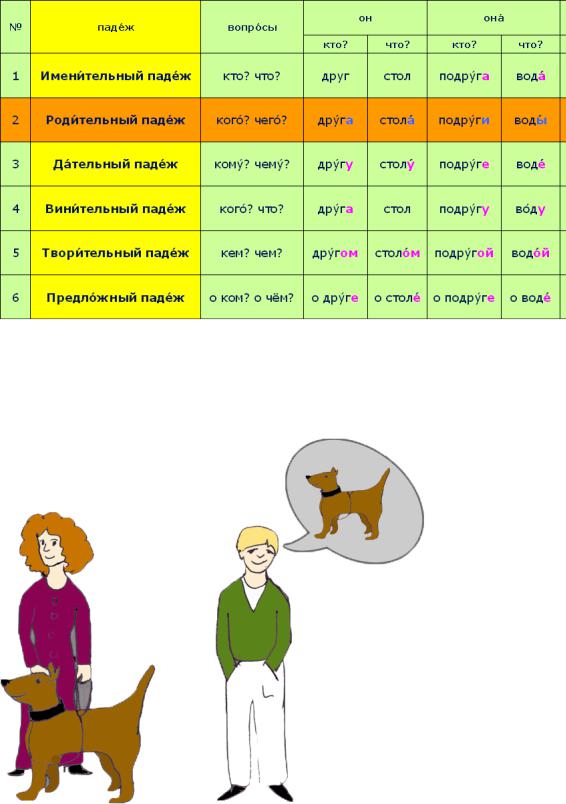
20.06.2015 |
Time to Speak Russian::Grammar Notes |
Expressing absense: Genitive in negative sentenses with the word "НЕТ".
To express absence of something or somebody, in Russian we use the negative word "НЕТ" (there is no...) + a noun or a pro case to indicate what or who is absent or lacking.
У неё есть собака. |
У него нет собаки. |
To put a singular noun in the Genetive case, you have to do the following:
http://www.speakrussian.cie.ru/time_new/eng/grammar/ |
23/59 |
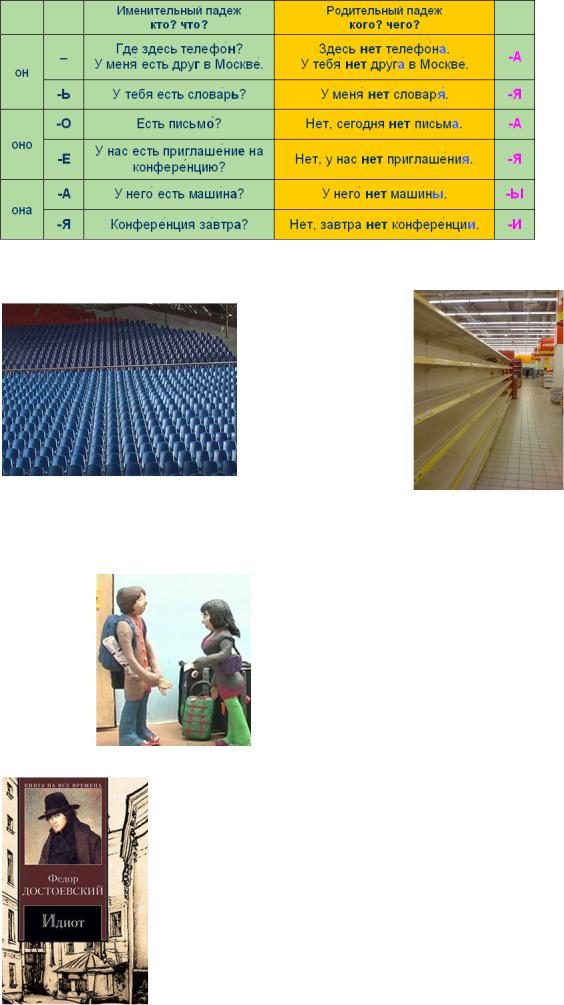
20.06.2015 |
Time to Speak Russian::Grammar Notes |
Negative pronouns " НИКТО́" (nobody) and "НИЧТО́" (nothing) have the following Genitive case forms: "НИКОГО́" and
Это зал. Здесь никого нет. |
Это магазин. Здесь ничего нет. |
́ |
́ |
POSSESSION: "ЧЕЙ?" (WHOSE?)
In Russian the Genitive case (2) is used to indicate WHO possesses an object (and to answer the question ЧЕЙ? ЧЬЯ? ЧЬЁ? is it? )
Это Джон.
Это его рюкзак. Чей это рюкзак? Это рюкзак Джона.
Это его газета. Чья это газета? Это газета Джона.
Это Мария.
Это её багаж. Чей это багаж? Это багаж Марии.
Это её визитка. Чья это визитка? Это визитка Марии.
Чей роман «Идиот»?
«Идиот» роман Достоевского.
2. Description or definition (what?)
http://www.speakrussian.cie.ru/time_new/eng/grammar/ |
24/59 |
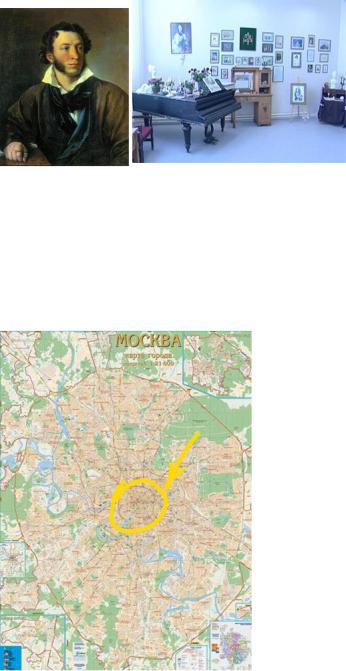
20.06.2015 Time to Speak Russian::Grammar Notes
The Genitive case is also used to answer the questions: КАКОЙ? КАКАЯ? КАКОЕ? КАКИЕ? (what?)
Это Пушкин, русский поэт. |
Это Музей Пушкина. |
|
(Какой это музей?) |
Какая это улица? – Это улица Чехова. Какой это театр? – Это Театр оперы и балета.
3. PART AND WHOLE
To describe a certain part of a whole object, the combination of two nouns is often used: the first one indicates a part and the Genitive case, indicates the whole object. For example:
Это центр города.
Париж – столица Франции. Дай мне стакан воды!
Please, note!
To put such a phrase in a different case, you will need to change the first noun form. But the second noun in the Genitive cas example:
Вот центр Москвы. В центре Москвы находится Театр оперы и балета. В Театре оперы и балета работают известны
GENITIVE CASE AFTER NUMERALS
To indicate a precise quantity, we use the construction "a numeral plus a noun".
When there is one object, a noun is always in the Nominative case and a numeral agrees with the noun's gender:
один час одна минута одно такси
If there are more objects than one, the construction "a numeral + a noun in Genitive singular or plural" is used. Please, stud
числительное +существительные мужского рода:
http://www.speakrussian.cie.ru/time_new/eng/grammar/ |
25/59 |
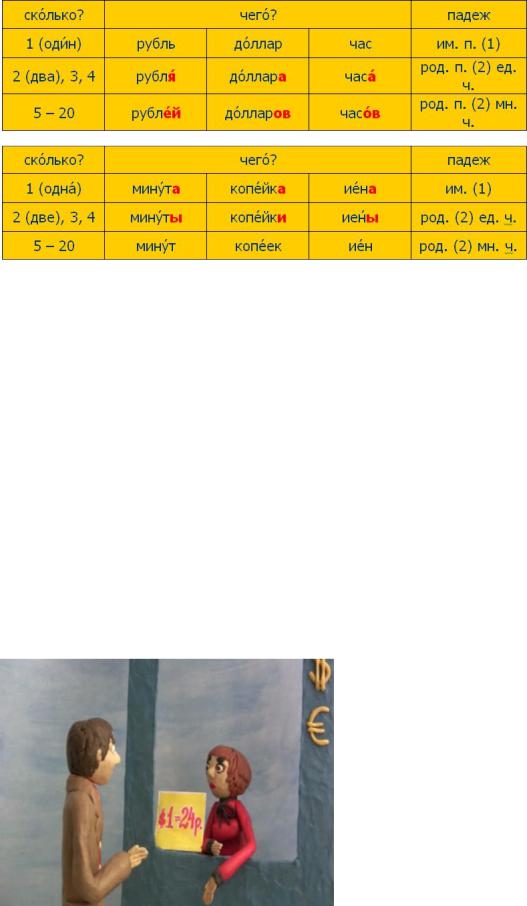
20.06.2015 |
Time to Speak Russian::Grammar Notes |
числительное + существительные женского рода:
Please, note! The noun agrees with the last numeral!
20(двадцать) рублей, долларов
21(двадцать один) рубль, доллар
22(двадцать два) рубля, доллара
25 (двадцать пять) рублей, долларов
30(тридцать) минут
31(тридцать одна) минута
32(тридцать две) минуты
35(тридцать пять) минут
Please, note the word forms: два / две ("two")
два студента, два доллара (2 + существительные мужского рода) две студентки, две книги (2 + существительные женского рода)
The invariant (never changing) nouns (see the section "Plural Nouns (continued)") do not change their form even when coun
1 один евро, одно интервью, одно такси
2 (два) евро, интервью, такси
5 (пять) евро, интервью, такси
Complex sentence with the word «который» (which, that)
To describe a person or inanimate object (i.e. to answer the question: какой? = what is it like?), we can use a complex senten "который".
Например:
Это человек. Он меняет деньги.
Какой это человек? – Это человек, который меняет деньги. Это девушка. Она работает в банке.
Какая это девушка? – Это девушка, которая работает в банке.
The word "который" behaves as an adjective: it is inflected for gender and number to agree with the word it serves as a sub
человек – он – который девушка – она – которая люди – они – которые
The same happens when the word "который" serves as a substitute for the inanimate noun:
стол он который книга она которая дерево оно которое
http://www.speakrussian.cie.ru/time_new/eng/grammar/ |
26/59 |
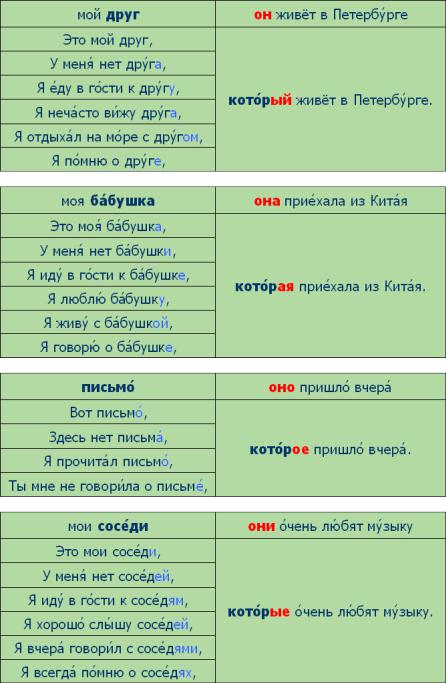
20.06.2015 |
Time to Speak Russian::Grammar Notes |
книги они которые
Please, remember!
The form of the word "который" is determined by its function in a subordinate clause, not in the principal one! Please, cons that starts with the word "который" doesn't change, and it can be added to any principal clause from the left column.
How to describe location of a person or object using the verb “находиться” (=to be
In informal speech to describe a location of a person or object, we use simple grammatical models:
Я в кино.
Анна на работе.
Книга на столе.
However, when we want to emphasize the meaning of the phrase, we use the verb НАХОДИ́ТЬСЯ (= to be located).
Президент сейчас нахо́дится в Италии.
Красная площадь нахо́дится в Москве.
Мы сейчас нахо́димся около здания университета.
Sentences with the verb "находиться" sound more formal. Compare:
Красная площадь – в центре Москвы. – Conversational (informal) style
http://www.speakrussian.cie.ru/time_new/eng/grammar/ |
27/59 |
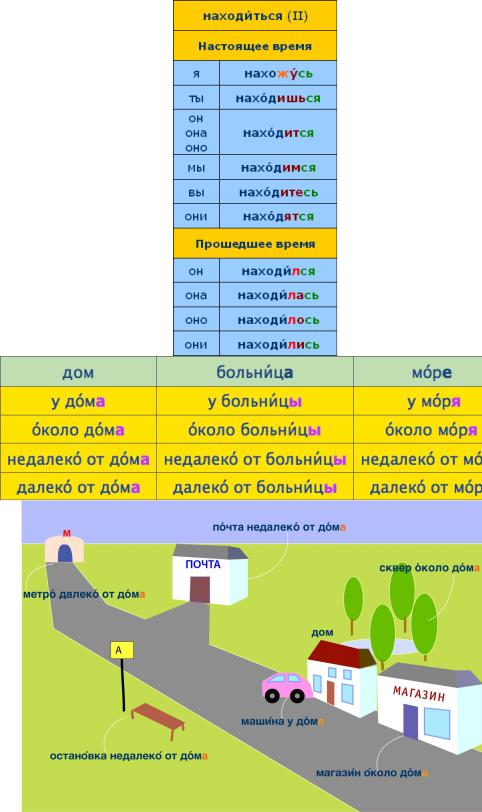
20.06.2015 Time to Speak Russian::Grammar Notes
Красная площадь находится в центре Москвы. – Formal style
The verb "находи́ться" is reflexive, please, note how it conjugates:
Possibility or impossibility of action: "Мо́жно / нельзя́"
To express the idea of possibility (or impossibility) of an action, we use words "МО́ЖНО" (=it’s possible, feasible, allowed) a impossible, not allowed) + the verb Infinitive.
Здесь можно плавать, в бассейне есть вода. |
Здесь нельзя плавать, в бассейне нет воды. |
||||
́ ́ |
́ |
́ |
́ ́ |
́ |
́ |
http://www.speakrussian.cie.ru/time_new/eng/grammar/ |
28/59 |
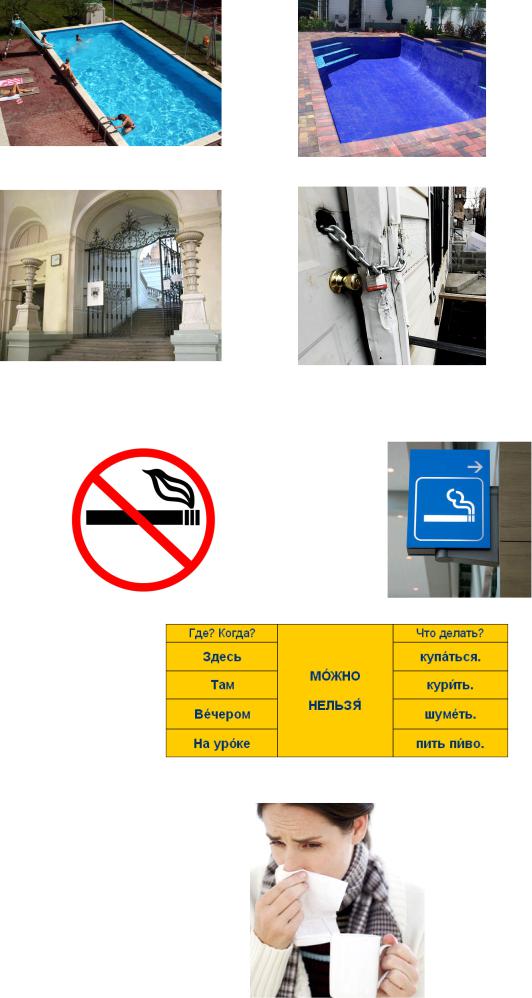
20.06.2015 |
Time to Speak Russian::Grammar Notes |
Здесь можно войти. Дверь открыта. |
Здесь нельзя войти. Дверь закрыта. |
|||
́ |
́ |
́ |
́ ́ |
́ |
2. The same construction is used to indicate that a certain action is allowed or prohibited.
Здесь нельзя курить. |
Там можно курить. |
́ ́ |
́ ́ |
3. To express who is allowed or forbidden to do something, this construction is supplemented by a noun or pronoun in the Da person.
У О́льги грипп. Ей нельзя́есть моро́женое и ходи́ть на рабо́ту. Ей мо́жно сиде́ть до́ма и пить горя́чий чай.
Please,< note! In such a sentence, you can't use a noun in the Nominative case. The Dative case is required for a noun or pro
http://www.speakrussian.cie.ru/time_new/eng/grammar/ |
29/59 |
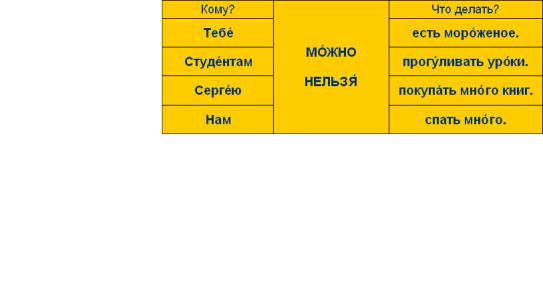
20.06.2015 |
Time to Speak Russian::Grammar Notes |
|
person who is allowed or not allowed to perform a certain action. |
Expressing a favorable opinion and emotional attitude
1. Expressions similar to «Какая хорошая идея!» (What a good a idea!), «Как кра beautiful!)
When we want to convey that we like something very much, we can use an exclamative sentence accompanied by a special in intonational construction is called ИК5 (IC5). When we pronounce such a sentence, we use a higher voice pitch than usual.
A similar intonational model is used to express a hight degree of a qualitative characteristic. In this case, the pitch is slightly exclamative sentences.
Note that though the words that start such exclamative sentences look like interrogative words, their function is not to form express a positive emotional evaluation (our admiration or happiness about a certain fact).
Expressions similar to «Такая хорошая идея!» (It’s such a good a idea!), «Так кр beautiful!)
To express a delight or admiration for someone's action, you can use the construction: "ТАК + adverb + verb".
Ты так хорошо́поёшь! Она так прекра́сно игра́ла!
Мы так замеча́тельно отдохну́ли!
To express an admiration for some characteristic of an object, we use the construction: ТАКОЙ/ТАКАЯ/ТАКОЕ/ТАКИЕ +
Тако́й интере́сный го́род! Така́я краси́вая де́вушка! Ты тако́й у́мный!
Эта у́лица така́я дли́нная!
Please, note! We can express the same meaning using the construction with the words "как" and "какой" but the word ord be different.
Как хорошо́ты поёшь! Как хорошо́она игра́ла!
Как мы прекра́сно отдохну́ли! Како́й ты у́мный! Кака́я дли́нная улица!
Verbs of motion are a big and a diverse group in the Russian language. We will go through the whole group of these verbs st
1. Идти (walk) – ехать (ride)
"Идти" indicates walking, going by foot, while "ехать" indicates using a transport. Please, remember that "идти́" and "е́ха imperfective verbs!
http://www.speakrussian.cie.ru/time_new/eng/grammar/ |
30/59 |
